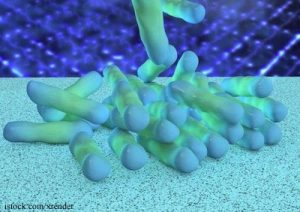 Shigella has been making headlines recently with outbreaks in California and Texas. Although it sickens an estimated half million Americans each year, many people are unfamiliar with the bacteria. Here’s what you need to know.
Shigella has been making headlines recently with outbreaks in California and Texas. Although it sickens an estimated half million Americans each year, many people are unfamiliar with the bacteria. Here’s what you need to know.
Shigella is highly contagious. People who have a Shigella infection, called shigellosis, should stay home.
There are four species of Shigella. Shigella sonnei – the most common in the U.S., Shigella flexneri, Shigella boydii, and Shigella dysenteriae – which causes deadly epidemics but is rare in the U.S..
Nationwide, about 500,000 cases of shigellosis are reported annually. Unlike Norovirus, which is also highly contagious, Shigella doesn’t have a “season.” (Norovirus season is form October through February.)
Shigella affects people of all ages, but young children are at greatest risk. Outbreaks are most often associated with daycare or child care centers. It only takes a few Shigella bacteria to cause illness. That’s why good hand washing and staying home when you are sick is the best way to prevent the spread of illness.
Symptoms of shigellosis usually begin between 24 and 48 hours after exposure. They include fever, diarrhea that can sometimes be bloody, abdominal pain, vomiting and tenesmus, or the painful sensation of needing to pass stools even when bowels are empty.
Symptoms usually last about a week, but it sometimes takes several months before bowel habits return to normal. Shigellosis can cause serious illness and death. Patients with severe diarrhea or vomiting can become dehydrated and require immediate medical attention to prevent shock.
Complications of shigellosis include reactive arthritis which causes painful swelling of the joints and eye irritation. These symptoms can last for months or years. Other complications manifest more quickly and have more dire consequences including bloodstream infections, seizures, and hemolytic uremic syndrome (HUS) which causes kidney failure, seizure, stroke, coma, and death.
Shigellosis is diagnosed with lab tests. Recommended treatment is staying hydrated and getting rest. Pepto Bismal, or similar products can also help. Antibiotic treatment is generally not required. It is sometimes recommended in severe cases, but shigellosis is often antibiotic resistant.
The CDC has declared antibiotic-resistant Shigella an urgent public threat in the United States. The agency estimates that of the 500,000 reported cases of Shigella infection in the U.S. each year, about 27,000 are resistant to one or both of these antibiotics
The Shigella outbreaks in Texas and California are both Shigella sonnei outbreaks. The California outbreak has been linked to Mariscos San Juan restaurant. So far, 190 illnesses have been reported. There have been many hospitalizations including 12 people who were admitted to intensive care.
Almost all of those who became ill ate at the San Jose restaurant located at 205 N. 4th Street in San Jose on Friday, October 16 or Saturday, October 17. The origin of the outbreak has not yet been determined. Health officials are expecting results of tests on all food handlers this week.
In Texas, there have been 71 cases of shigellosis reported at daycare centers and schools so far this month. Normally, only a handful of cases are reported.




